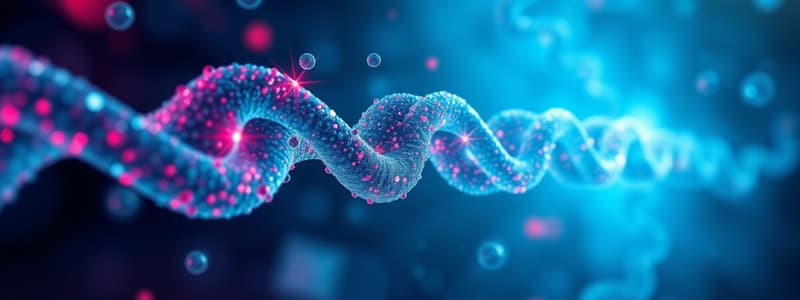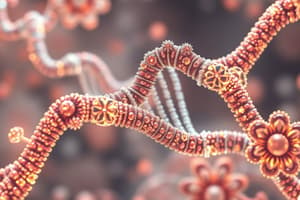Podcast
Questions and Answers
What does PCR stand for?
What does PCR stand for?
Polymerase chain reaction
What are the three basic steps in PCR?
What are the three basic steps in PCR?
- Denaturation (correct)
- Primer extension (correct)
- DNA fusion
- Primer annealing (correct)
What happens during denaturation in PCR?
What happens during denaturation in PCR?
DNA separates from double-stranded to single-stranded at 94°C for 30 seconds.
What temperature and duration are used for primer annealing?
What temperature and duration are used for primer annealing?
What occurs during primer extension?
What occurs during primer extension?
Who discovered cloning?
Who discovered cloning?
Flashcards are hidden until you start studying
Study Notes
PCR Overview
- PCR stands for Polymerase Chain Reaction, a technique to amplify DNA.
- Essential process in molecular biology for various applications like cloning, sequencing, and diagnosis.
Three Basic Steps of PCR
-
Denaturation
DNA is heated to 94°C for 30 seconds, causing the double-stranded DNA to separate into single strands. -
Primer Annealing
Temperature is lowered to 55°C for 45 seconds, allowing oligonucleotide primers to bind to the single-stranded DNA. -
Primer Extension
At 72°C for 2 minutes, Taq polymerase synthesizes new DNA strands, with Thermus aquaticus bacteria providing the heat-stable enzyme.
Key Enzyme and Organism
- Taq polymerase, derived from Thermus aquaticus, is vital due to its ability to withstand high temperatures during PCR.
Contribution to Molecular Biology
- Paul Berg is credited with the discovery of DNA cloning, a foundational technique leading to advances in genetic engineering and biotechnology.
Studying That Suits You
Use AI to generate personalized quizzes and flashcards to suit your learning preferences.




